HRMS software in India has evolved from a basic HR tool into a critical part of business infrastructure. By 2026, HRMS platforms are no longer limited to employee records or attendance tracking they play a central role in payroll accuracy, statutory compliance, audit readiness, and executive reporting.
This shift is driven by structural changes in India’s business environment. Labour law enforcement is becoming stricter, payroll audits are increasing, and companies are expanding rapidly across states and borders. At the same time, hybrid and remote work models have made manual HR processes unscalable and error-prone.
As a result, companies now adopt HRMS in India not for features alone, but to gain control, consistency, and compliance. However, not all HRMS platforms meet these expectations. While some remain basic HR tools, others offer robust capabilities designed for complex payroll, compliance, and growth requirements.
This guide takes a practical, decision-oriented approach to evaluating the top 10 HRMS software in India for 2026. Instead of listing features, it focuses on what matters most when HRMS becomes business-critical statutory readiness, functional depth, scalability, and overall value.
What is an HRMS Platform?
A Human Resource Management System (HRMS) is a suite of software applications designed to streamline and automate human resource functions across the employee lifecycle. This includes core processes such as hiring, onboarding, payroll, compliance, performance management, and employee offboarding.
According to the PwC HR Technology survey, over 58% of companies now use HR technology to attract, manage, and retain talent—underscoring the growing importance of HRMS platforms for modern organizations.
Who uses an HRMS?
- HR professionals rely on it for workforce management, compliance tracking (PF, ESI, PT), and recruitment processes.
- People managers use it for evaluating performance, managing attendance, and approving time-off.
- Employees engage with HRMS platforms to access payslips, submit leave requests, and track personal records.
- Finance teams and leadership leverage HRMS data for payroll analysis, headcount insights, and budget planning.
Why is it important?
An HRMS serves as a centralized system of record for people-related data. It not only simplifies HR operations but also enables better decision-making by providing real-time visibility into workforce costs, compliance status, and performance metrics. This makes it an essential tool for scaling businesses and maintaining operational efficiency.
What Makes the Best HR Software in India Stand Out?
The best HRMS software in India combines automation, compliance, and usability in one powerful system. It’s not just about managing payroll or attendance it’s about creating a connected, data-driven workplace. Top HR tools today integrate employee self-service, AI-powered analytics, and seamless payroll features that comply with Indian regulations. Whether you’re a startup or a growing enterprise, investing in the right HRMS ensures smoother operations, fewer errors, and improved employee satisfaction.
Key Features to Look for in HRMS Software in India
Before choosing the best HR software in India, evaluate these must-have features:
- Automated Payroll & Compliance: Handles PF, ESI, PT, and TDS with accuracy.
- Employee Self-Service: Empowers staff to manage their data, payslips, and leaves.
- Mobile Accessibility: Cloud-based dashboards for remote or hybrid teams.
- Integration Capability: Works with accounting tools, attendance apps, and CRMs.
- Scalability: Grows with your workforce and adapts to your HR complexity.
- Advanced Analytics: Provides insights into attrition, payroll cost, and workforce planning.
These features make HRMS software indispensable for organizations seeking efficiency and compliance in 2026.
Benefits of Using HRMS Software in India
As your company grows, spreadsheets and manual workflows can slow you down. Here are five key benefits of implementing a modern HRMS:
- Centralized Employee Data: Maintain a secure, unified database of employee records, from onboarding to exit.
- Automated Payroll Processing: Reduce errors and save time by automating payroll, tax calculations, and payslip generation.
- Regulatory Compliance: Stay compliant with Indian labor laws like PF, ESI, PT, and TDS with built-in compliance modules.
- Performance & Attendance Management: Easily track attendance, leave, and performance with self-service portals and mobile access.
- Analytics & Reporting: Make data-driven decisions with dashboards for attrition, cost per hire, and payroll forecasting.
Suggested Read: Best Payroll Compliance Software in India
How HRMS Software Improves Employee Experience
Modern HR isn’t just administrative it’s experiential. The best HRMS software in India enhances employee engagement by giving staff direct access to key information. From self-service portals to real-time attendance tracking and mobile approvals, HRMS tools simplify communication and transparency. This leads to higher retention rates, better morale, and a culture of accountability essential for growing businesses in 2026.
Top 10 HR Software in India (2026 Edition)
Are you aware that almost 70 percentage of the organizations in India are now planning to invest in HR software? So, Best HR software in india will now become an undoubtedly a tool that will transform your HR operations to increase efficiency. Here is a list of well researched top 10 HRMS solutions that are available in India.
1: Asanify
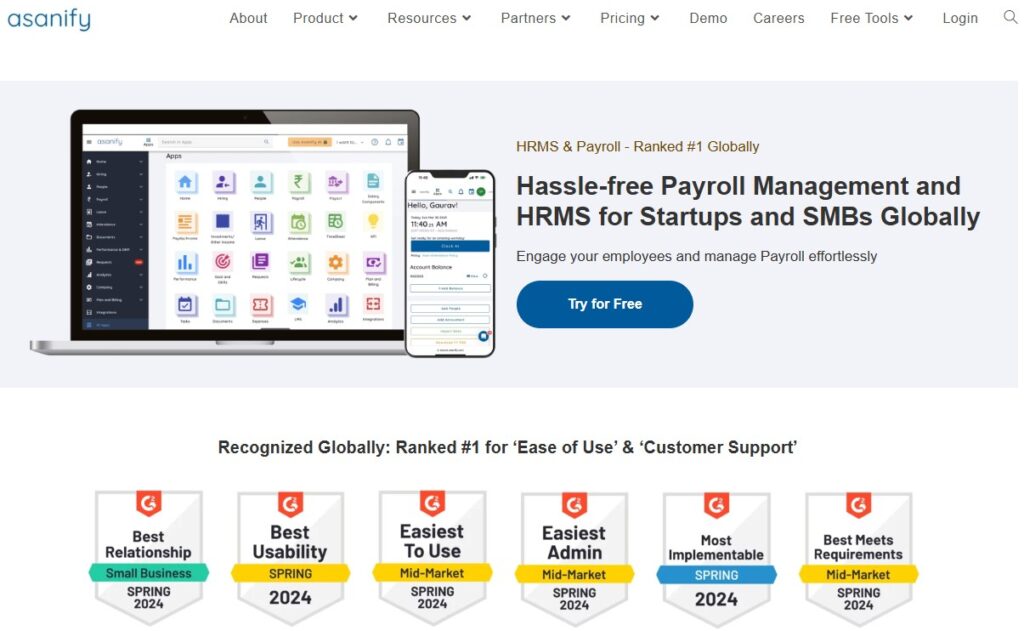
Asanify is an HRMS that has been designed by keeping in mind customers as the best interest. The software also aims at making the HR process more agile and helps in both cost and time savings. It is also focused on helping fast-growing businesses along with young startups to scale quickly. The user-friendly platform also makes it one of the easiest to use and most engaging platforms.
Key Features
- Offers free trials for people to experience the software before you take any firm decision
- Single-click payroll that helps get rid of complex calculations
- Quick and automated employee onboarding processes
Pros
- Dedicated module that manages employee leaves with ease
- Elite end-to-end HRMS services that are available at pocket-friendly rates
- Seamless attendance policy management
Cons
- Can not be used for free once the free trial is over
- Integration with apps such as Tally is still a work in progress
Pricing: Starts at Rs. 1,499/month for up to 10 employees. Scalable plans available.
Best For
Asanify is one of the best HR software for entrepreneurs, small businesses, and fast growing startups. Not to mention even global enterprises can access a budget-friendly yet one of the most compatible software.
2: Keka
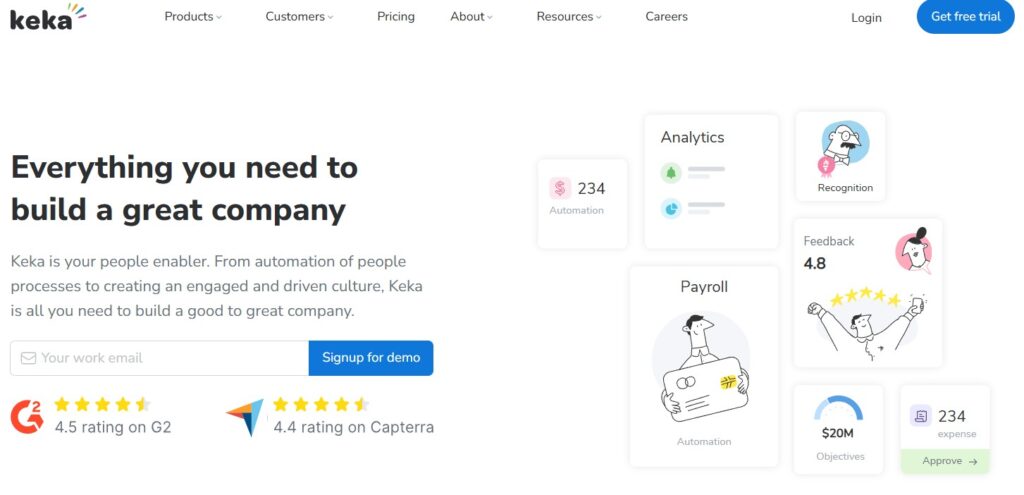
Keka HR is one of the leading HR tech solution especially for SMEs that offers a single platform to manage almost all the HR operations. With the help of Keka HR, it is possible for businesses to manage HR operations effectively while also improving employee productivity.
Key Features
- Automated payroll calculations and processes
- Efficient management of employee database that is centralized and easy to access
- Streamlined employee time sheets to easily track workforce management.
Pros
- Offers a wide range of HR management features
- Automated a lot of various HR tasks
- Self-service portal for employees
Cons
- Pricing is very high for small businesses
- Complex modules for small business needs
- Technical assistance is required for the integration
Pricing
There are three pricing plans –
- Foundation – Rs. 6999 for 100 users per month
- Strength – Rs. 9999 for 100 users per month
- Growth – Rs. 13999 for 100 users per month
Best For
It is best suited for all small and medium-sized organizations.
3: greytHR
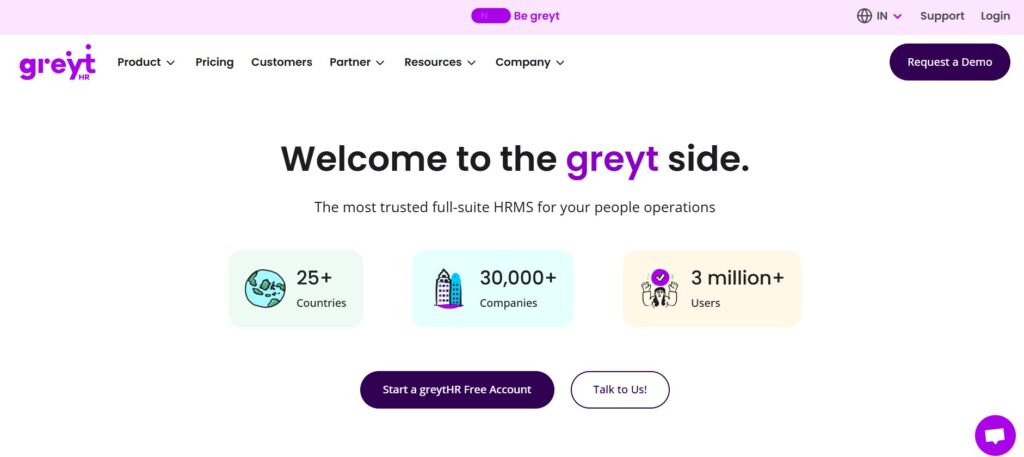
GreytHR is considered to be one of the leading HR software solutions that helps in streamlining HR processes while also empowering employees. It is quite easy to keep your team productive and focused while utilizing this software.
Key Features
- Employee data management along with a self service portal
- Compliance with all local regulations and laws
- Simplified attendance and leave management.
Pros
- Its customer support is responsive and nimble with a quick turnaround time
- It is compliant with all the regulations
Cons
- The mobile app is often slow and lags quite frequently
- Platform tends to show some errors and glitches
Pricing
There are three pricing plans as follows:
- Essential – Rs. 3495 per month for 50 employees
- Growth – Rs. 5495 per month for 50 employees
- Enterprise – Rs. 7495 per month for 50 employees.
Best For
The ideal choice is for large and medium-sized organizations.
4: ZingHR
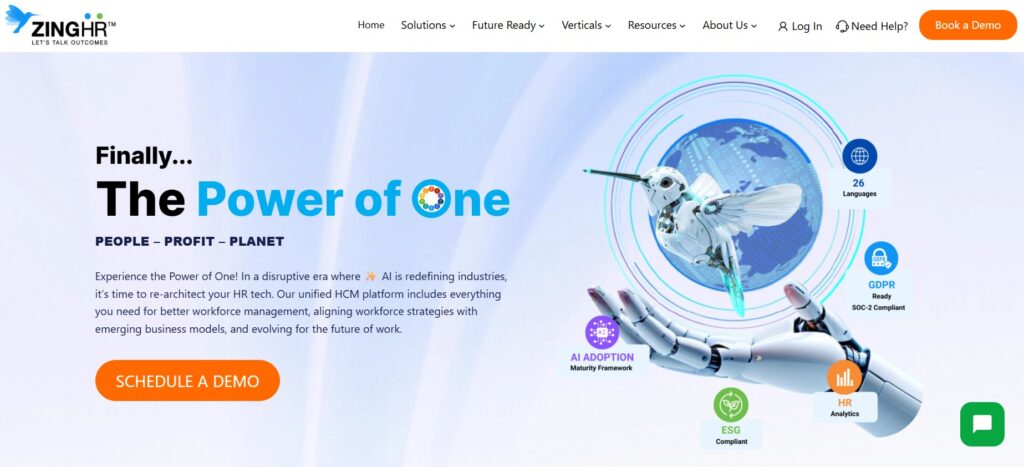
ZingHR is a cloud-based HRMS that provides an end-to-end solution for all the HR processes. With a few of the unique features, it helps organizations to streamline their HR processes and boosting their productivity.
Key Features
- Detailed analytics and reports for better decisions
- Simplified time and attendance tracking
Pros
- Consists of a mobile app
- Automated payroll processing with compliance with tax regulations
- Easy to use self-service tools for employees.
Cons
- Employee attendance management is an issue
- The time management feature is not available
Pricing
Zing HR’s affordable pricing starts right from Rs. 7250 per month for 50 employees.
Best For
This application is most suitable for small, medium, and large-sized organizations.
5: Darwinbox
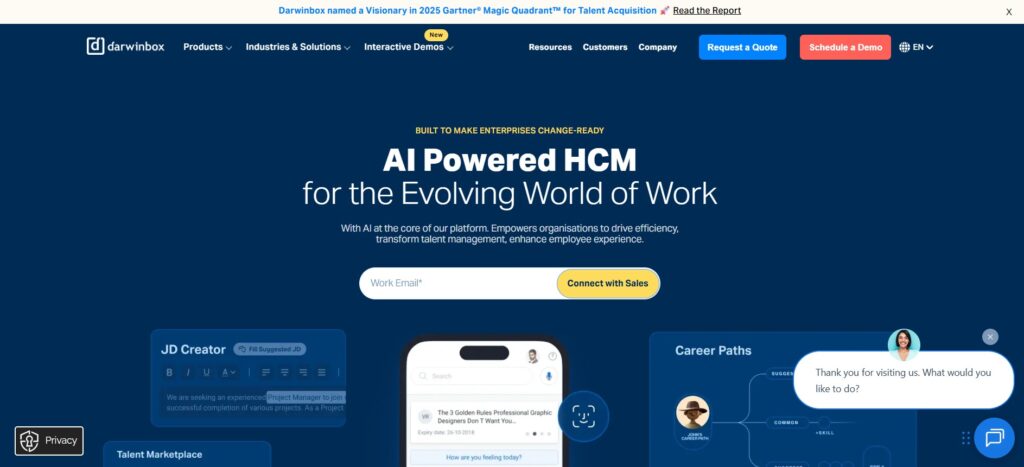
Darwinbox is considered to be a modern, cloud-based HR software that provides a range of services to help manage HR functions seamlessly while also maximizing productivity and efficiency. It also helps enhance employee engagement and streamline HR operations.
Key Features
- Automated HR process right from recruiting to offboarding
- Employee management and self-service tools
- Easy to manage leave requests and attendance management.
Pros
- Customizable integrations options
- Insights and analytics for better decision-making
- Simplified payroll processing
Cons
- Not stable and lacks scalability
- API integration with third-party apps needs to have improvements in them.
Pricing
Darwinbox follows a quotation-based and requirement-specific pricing model.
Best For
It is the best for all small and medium-sized organizations.
6: Zoho People
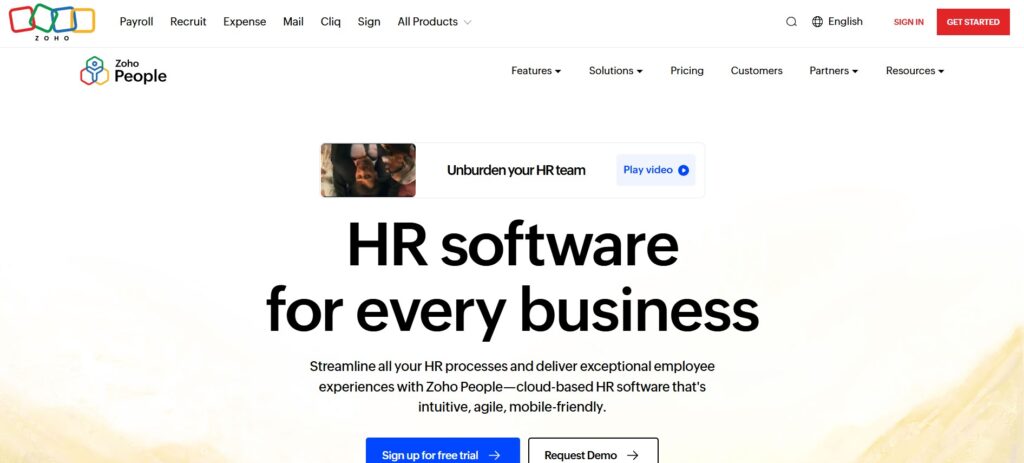
Zoho People is quite a user-friendly HRMS that simplifies complex HR processes. They also offer an extensive set of features that range from recruitment to exit all under a single platform.
Key Features
- Automated onboarding and offboarding process
- Simple to use and set goals while also keeping track of performance
- Efficient payroll processing with cumbersome tax calculations taken care of.
Pros
- Flexible time and attendance tracking
- Recruitment and applicant tracking can be done seamlessly.
Cons
- Payroll features are only limited to India
- The platform lacks 24/7 chat or phone support
Pricing
Zoho People’s package starts from Rs. 48 per month for a single user and it is usually billed at the end of the year.
Best For
The ideal choice would be for all large and medium-sized organizations.
7: Qandle
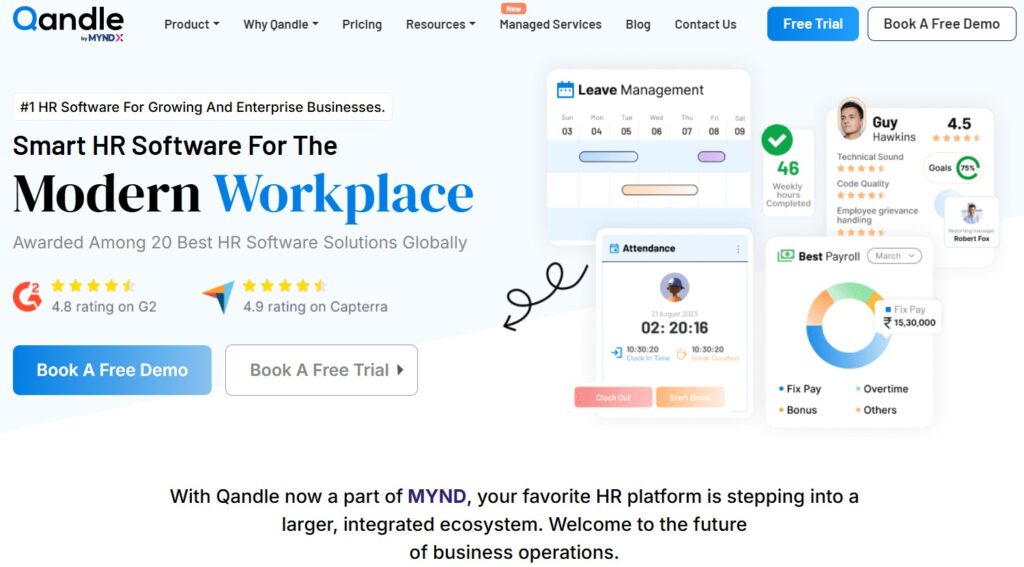
Qandle tends to provide quite a cost-effective HR platform that consists of all essential features for managing the HR processes. It is also user-friendly and consists of asset tracking and leave management.
Key Features
- Onboarding and asset management
- Compliance and payroll processing
- Enhanced attendance and leave management
Pros
- Easy to use and covers all important aspects
- The attendance system is easy to use
Cons
- The application tends to crash and consists of bugs
- Slow module loading and geotagging is an issue
Pricing
The pricing for Qandle HRMS starts from Rs. 2450 per month for 50 employees. It goes up to Rs. 6450 per month for 50 employees.
Best For
Best for all businesses that seek a comprehensive and customizable HRMS. Also good for small and medium-sized organizations.
8: FactoHR
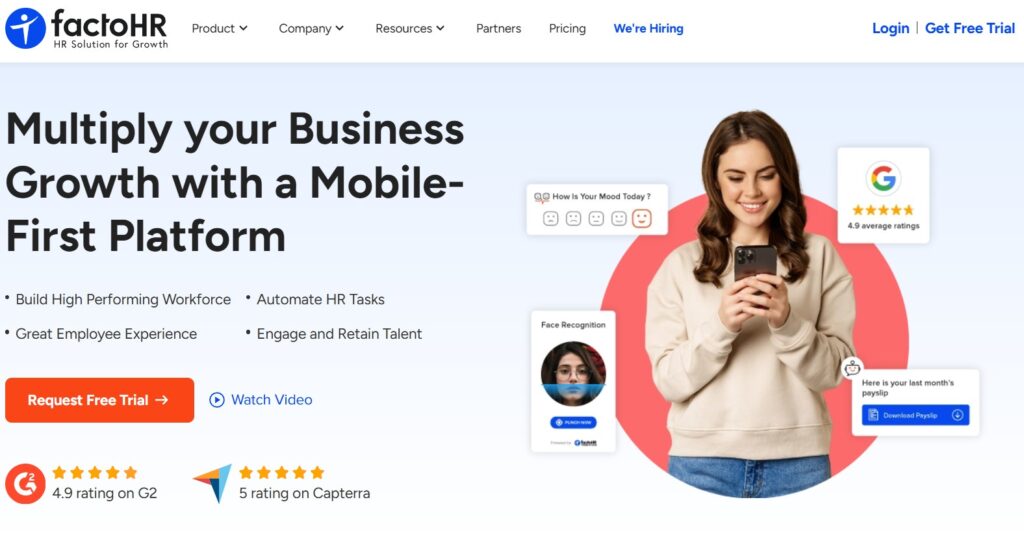
FactoHR is a cloud-based comprehensive HR software that is specifically designed to streamline and automate HR processes. It is also one of the ideal solutions for almost all types of businesses.
Key Features
- Onboarding and performance management
- Payroll and expense management
- Reporting and analytics
Pros
- Scalable and configurable
- Quick implementation
- Extensive feature set
Cons
- The potential learning curve for complex configurations
- Limited features that are advanced according to industry requirements.
Pricing
There are 5 pricing options and consist of prices ranging from Rs. 2,999 to Rs. 5,999. This could vary based on the edition chosen.
Best For
Best for all organizations such as small, medium, and large looking for a versatile HR solution.
9: SumHR
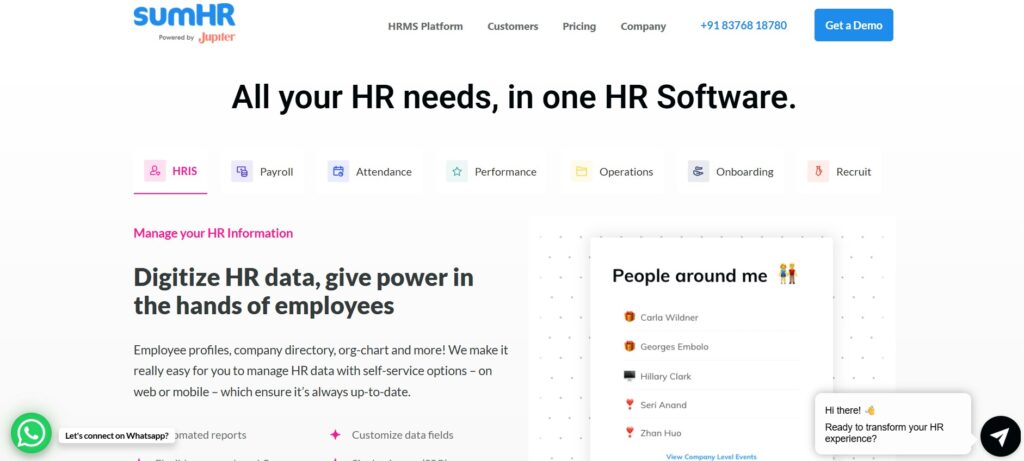
Sum HR is a cloud based HRMS that aims to ease out the HR processes. It also reduces reliance on spreadsheets.
Key Features
- Automated payroll processing, expense claims, and compliance management
- Access to key information and features on the go
- Access to attendance and leave management
Pros
- It streamlines HR processes such as onboarding and payroll
- Provides affordable pricing plans, especially for small-scale businesses.
Cons
- UI could be quite outdated and not so polished
- There are a few slow performance issues.
Pricing
The pricing starts at as low as Rs. 49 per month. This is usually billed annually.
Best For
One of the best options for small and medium-sized businesses.
10: HROne
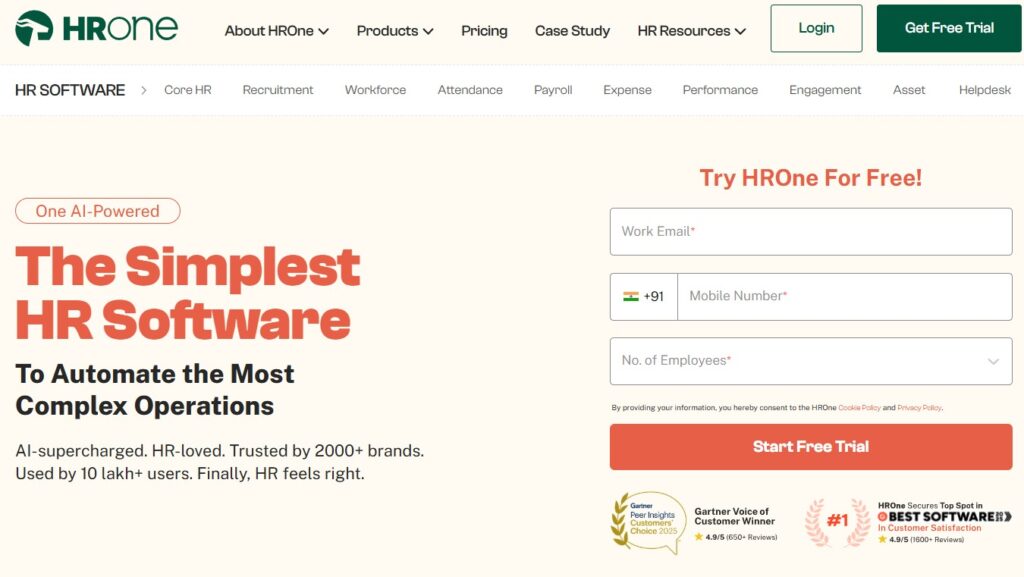
HROne is a cloud-based HRMS that helps businesses to simplify the operations related to HR. With its unique features, HROne tends to automate and streamline the workforce while also improving efficiency.
Key Features
- Simple and accurate payroll processing
- Analytics and Reporting
- Automated onboarding process
Pros
- The interface is quite user-friendly
- Data management is centralized which provides efficient management of employee information
- Streamlining of HR processes.
Cons
- While generally user-friendly, a few of the extensive features could be a bit complex
- The survey tool within HROne is not so robust or feature-rich.
Pricing
HROne follows an upon-request quotation-based pricing model.
Best For
Ideal for all small, medium and large-sized organizations.
Asanify vs Keka vs Zoho: Feature Comparison
| Feature | Asanify | Keka HR | Zoho People |
|---|---|---|---|
| Payroll Automation | Yes | Yes | Yes |
| Indian Tax Compliance (PF, ESI) | Fully Automated | Yes | Partial |
| WhatsApp Payslips | Yes | No | No |
| Performance Reviews | Yes | Yes | Yes |
| Integration with Slack/Zoho | Yes | Limited | Native Zoho Only |
| Mobile App | Yes | Yes | Yes |
| Employee Self-Service | Yes | Yes | Yes |
| Pricing (Starting) | Rs. 1,499/month | Rs. 6,999/month | Rs. 48/user/month |
How to Choose the Best HRMS Software in India
1. Identify Your Business Needs
- Define your HR priorities (e.g., payroll, hiring, engagement).
- Assess user count and compliance needs.
- New firms may focus on recruitment; established ones may prefer performance reviews.
2. Evaluate User-Friendliness
- Look for intuitive dashboards and mobile access.
- Trial or demo the software for usability.
3. Cloud-Based vs On-Premise
- Cloud-based: Remote access, automatic updates, scalable pricing.
- On-premise: More control, higher upfront cost, better data privacy.
4. Integration Options
- Ensure compatibility with existing systems (e.g., accounting, CRM, time tracking).
5. Compliance and Security
- Must meet laws like GDPR, HIPAA, and Indian labor regulations.
- Look for role-based access, encryption, regular updates.
5. Payroll
- Core HR integration to avoid duplication.
- Multi-currency, payroll codes, time & attendance sync.
- Employee self-service and validation tools.
Suggested Read: 13 Types of HRMS Software: How to Choose the Right One
The Future of HRMS in India: Trends to Watch in 2026
HR technology in India is advancing fast. Expect these trends to shape the coming year:
- AI-Powered Recruitment: Automating candidate shortlisting and onboarding.
- Mobile-First HR: Enabling remote HR management through intuitive apps.
- Integrated EOR Capabilities: HRMS platforms partnering with Employer of Record (EOR) providers to hire globally.
- Data-Driven HR: Analytics dashboards transforming decision-making.
Companies investing early in these technologies will future-proof their HR operations and stay compliant as labor laws evolve.
Why Asanify is the Ideal HR Software for Indian Businesses
In a country as regulation-heavy and operationally diverse as India, HR software must go beyond the basics. Asanify is purpose-built to handle India-specific compliance, while simplifying everyday HR tasks for startups and fast-scaling companies. Here are the standout features that make Asanify a must-have for Indian businesses:
Smart Attendance & Leave Tracking
Asanify’s cloud-based dashboard allows managers to monitor leave balances, attendance logs, and holiday calendars in real-time. Automated rules ensure your organization stays compliant with state-wise labor laws — all without manual effort.
Effortless Payroll Automation
Run payroll in just one click, with automatic calculations for PF, ESI, PT, TDS, reimbursements, and bonuses. Asanify even generates payslips and statutory filings—ready to download or send via WhatsApp.
Built-in Compliance Engine
No need to track changing labor laws manually. Asanify stays up-to-date with India’s evolving tax and compliance landscape, helping you meet all mandatory reporting and remittance requirements, stress-free.
Performance Reviews Made Simple
From goal-setting to periodic feedback cycles, Asanify offers customizable performance workflows that support 360-degree reviews. Visual dashboards give leadership clear insights into individual and team-level performance.
Employee Self-Service Portals
Empower your workforce with a secure, mobile-accessible portal for everything viewing payslips, applying for leave, submitting documents, and tracking their own compliance status.
Mobile-First HR Access
Whether you’re running HR remotely or managing teams across multiple cities, Asanify’s mobile-first design ensures managers and employees can perform HR actions on-the-go, without delays.
Conclusion
It’s evident that the correct technology substantially influences your business’s HR operations. These systems handle fundamental tasks and offer crucial insights that facilitate improved decision-making and a more engaged employee base. Utilizing a powerful HRMS such as Asanify can fundamentally change how you manage payroll, performance, and employee engagement, converting them from simple tasks to strategic resources.
The objective is to discover a solution that simplifies your workflows and supports your team’s growth and contentment. We trust this guide will be a useful tool in your search for HRMS software that will elevate your HR practices and drive your business forward. Feel free to contact us for more details or further insights into the HRMS market. You could also try out a free trial at Asanify today to check whether we match all your needs!
Frequently Asked Questions (FAQs)
Asanify is the best HR software for Indian startups due to its automated compliance, WhatsApp payslips, and startup-friendly pricing.
Asanify and Keka HR are both excellent for payroll, but Asanify offers end-to-end tax filings and WhatsApp delivery.
Yes, Asanify is fully compliant with PF, ESI, PT, TDS, and automatically generates relevant filings and payslips.
Absolutely. Asanify is cloud-based and mobile-friendly, with features like remote attendance tracking and WhatsApp notifications.
Asanify focuses on compliance, automation, and ease of use for startups, while Zoho People is broader but less optimized for Indian payroll.
HRMS (Human Resource Management System) software is a tool that helps businesses manage various HR functions, such as payroll, employee data, and recruitment, in a centralized system.
Startups typically benefit most from an HRMS like Asanify that includes payroll automation, statutory compliance (PF, ESI, PT, TDS), and performance tracking all in a single platform with minimal setup.
HR software typically falls into three categories: HRIS (for core HR tasks), HCM (for talent and workforce planning), and HRMS (a complete suite combining both).
Yes, Asanify does offer free trials, so that potential customers can experience the software before making a purchase.
Not to be considered as tax, legal, financial or HR advice. Regulations change over time so please consult a lawyer, accountant or Labour Law expert for specific guidance.

